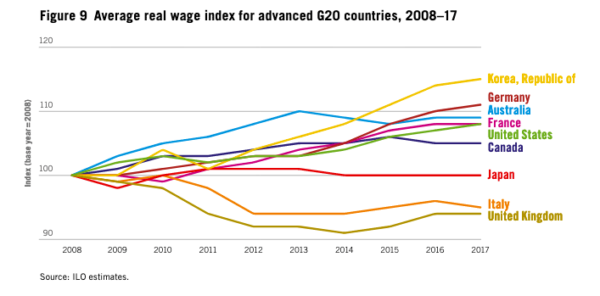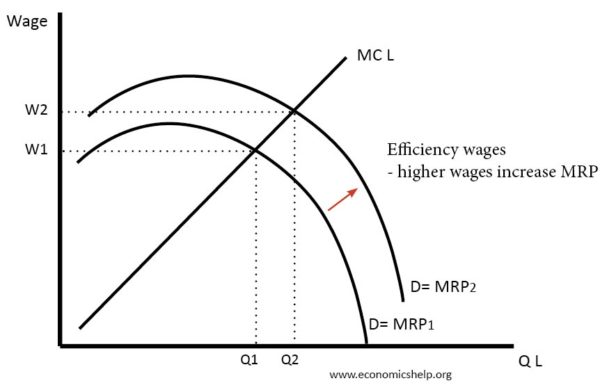Readers Question: Given the current environment, is it a valid argument of companies that increasing workers salaries will cause a loss of competitiveness? For example, cutting entry-level and middle-level workers salary while increasing management salaries will not change the profit levels of a company much.
Wages are a part of a firm’s costs. If wages increase then firms may have to respond to higher costs of production by putting up prices. However, it also depends on the productivity of labour (output per worker). If wages increase by 5%, but a worker’s productivity also increases by 5%, then a firm will not see a rise in costs.
In summary
- Increasing wages without any corresponding increase in labour productivity will tend to cause a loss of competitiveness for a firm compared to others.
- If a countries wage costs rise relative to other countries, you will tend to lose international competitiveness.
Evaluation of Wage costs
- It depends on how significant wage costs are as a % of the firm’s total costs. If the industry is labour intensive, such as farming or manufacturing or hairdressers, then an increase in wages will have a comparatively bigger impact on competitiveness.
- In your example, you suggest a wage increase for only those in management. If the wage increase is only to part of the workforce, then the impact on competitiveness will be much lower.
- It is possible a firm may increase wages, but not increase final prices, but accept a lower profit margin. For example, in a recession, firms may be reluctant to pass cost increases on to consumers. In this case, they won’t lose competitiveness but they will lose profitability.
Increased Wages and Increased Productivity
Real wages have increased in the past 50 years. But rising real wages don’t necessarily lead to a loss of competitiveness – if there is a corresponding rise in labour productivity. For example, improved technology has enabled a greater output per worker. This enables higher wages without a loss of competitiveness. In other words, labour costs more, but workers produce greater output, therefore the cost per output stays the same or even increases.
Example: German wages have increased since the 1950s quite dramatically, but they are amongst the most competitive countries in the world because of high labour productivity
Efficiency Wage Theory
The efficiency wage theory suggests that increasing wages, can in certain circumstances, increase labour productivity (MRP) because there is greater labour loyalty. If low paid workers get a pay rise, they may feel greater loyalty to the company and fear there is more to lose from being sacked. Therefore, a higher wage may inspire increased productivity. The extent of this efficiency wage theory is debatable, but it is theoretically possible.
MRP = marginal revenue product – the effective productivity of workers.
Wages and International Competitiveness
 A graph showing the average real wage growth for selected countries. This does not perfectly reflect competitiveness. UK wage growth has been very low, but it has also experienced the lowest productivity.
A graph showing the average real wage growth for selected countries. This does not perfectly reflect competitiveness. UK wage growth has been very low, but it has also experienced the lowest productivity.
- A more interesting question is what happens to a countries international competitiveness when there is a rise in relative wage costs compared to other countries?
- Wage costs imply you include both actual wages and labour productivity. A rise in relative wage costs could involve higher wages and/or lower labour productivity.
- If your wages costs rise to your main competitors, then you will tend to see a fall in competitiveness.
- In a floating exchange rate, a fall in competitiveness from higher wages will tend to see a depreciation in your exchange rate to restore competitiveness.
Wage Costs and the Euro
- In a fixed exchange rate (like the EU single currency) wage costs become much more important. Higher wage costs mean you lose competitiveness, however, you can’t devalue, therefore the loss of competitiveness becomes much more serious.
- This decline in competitiveness has been very damaging for many countries in the Eurozone such as Greece, Spain and Portugal. It means to restore competitiveness, there needs to be a prolonged period of internal devaluation i.e. falling wages, falling prices with a resulting lower economic growth.
Related

